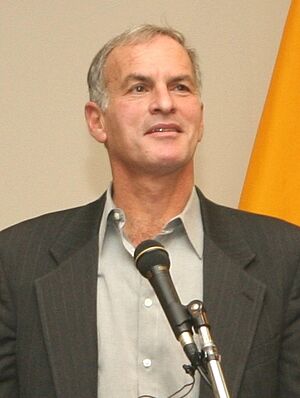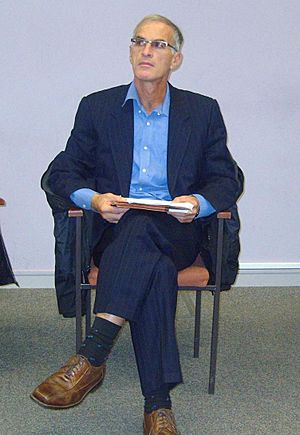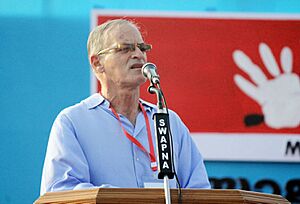Norman Finkelstein facts for kids
Quick facts for kids
Norman Finkelstein
|
|
|---|---|

Finkelstein in 2005
|
|
| Born |
Norman Gary Finkelstein
December 8, 1953 New York City, U.S.
|
| Education |
|
| Occupation | Professor, author |
|
Notable work
|
The Holocaust Industry (2000) |
Norman Gary Finkelstein (born December 8, 1953) is an American political scientist and activist. He studies the politics of the Holocaust and the Israeli–Palestinian conflict.
Finkelstein became well-known in 2000 after publishing The Holocaust Industry. In this book, he writes that the memory of the Holocaust is used to protect Israel from criticism. He often speaks out against Israeli policies and its government. In 2008, the Israeli government stopped him from entering the country for ten years. His most recent book about Palestine and Israel, published in 2018, is Gaza: An Inquest into Its Martyrdom.
Contents
Early Life and Education
Norman Finkelstein was born on December 8, 1953, in New York City. His parents, Harry and Maryla Finkelstein, were Jewish people who survived the Holocaust. His mother grew up in Warsaw and survived the Warsaw Ghetto and the Majdanek concentration camp. His father survived both the Warsaw Ghetto and Auschwitz.
After the war, his parents met in Austria and then moved to the United States. His father worked in a factory, and his mother was a homemaker and later a bookkeeper. Finkelstein's mother strongly believed in pacifism, which means she was against war and violence. Both his parents passed away in 1995.
Finkelstein said his parents viewed the world through the lens of the Nazi Holocaust. They felt very grateful to the Soviet Union for defeating the Nazis. Because of this, they were very critical of anyone who was against the Soviet Union. They supported the creation of Israel but felt Israel had become too close to Western countries.
Finkelstein grew up in Borough Park and later Mill Basin, both in Brooklyn, New York. He went to James Madison High School.
He finished his first degree at Binghamton University in New York in 1974. Later, in 1979, he studied in Paris at the École Pratique des Hautes Études. As a teenager, he was a strong follower of Maoism, a type of communism. He felt very let down when the "Gang of Four" was put on trial in 1976, which made him feel he had been misled.
He earned his Master's degree in political science in 1980. He then received his PhD in political studies from Princeton University in 1988. His PhD research was about Zionism, which is the movement for a Jewish homeland. Before becoming a professor, Finkelstein worked part-time helping teenagers who had dropped out of school in New York.
Finkelstein says his involvement in the Israeli–Palestinian conflict began in 1982. He and a few other Jewish people in New York protested against the Israeli invasion of Lebanon. He held a sign that showed his strong feelings against the war.
During the First Intifada (a Palestinian uprising), he spent every summer from 1988 in the West Bank. He stayed with Palestinian families in Hebron and Beit Sahour and taught English at a local school. Finkelstein wrote that most Palestinians did not mind that he was Jewish. He shared his experiences from the intifada in his 1996 book The Rise and Fall of Palestine.
Academic Career

Finkelstein taught at several universities. He was an adjunct lecturer (a part-time teacher) at Rutgers University from 1977 to 1978. He then taught at Brooklyn College (1988–1991), Hunter College (1992–2001), New York University (1992–2001), and DePaul University (2001–2007).
The New York Times reported that Finkelstein left Hunter College in 2001. This happened after his teaching hours and pay were reduced by the college. He said he enjoyed teaching at Hunter and was "kicked out" even after asking to stay on with fewer courses. Hunter College set conditions that he found unacceptable. Finkelstein also taught at Sakarya University Middle East Institute in Turkey from 2014 to 2015.
Writings and Research
Finkelstein describes himself as a "forensic" scholar. This means he carefully examines and tries to explain complex arguments. He has written strong academic reviews of other writers and scholars. He believes they sometimes misrepresent facts to support Israel's policies.
His writings cover sensitive topics like Zionism and the history of Palestine. He also writes about what he calls the ""Holocaust industry"." He claims this industry uses the memory of the Holocaust for political reasons related to Israel. He has also called himself an "old-fashioned communist." This means he believes that countries and governments have no real value.
Scholars like Noam Chomsky and historian Avi Shlaim have praised Finkelstein's work. Both his supporters and critics have noted his strong and direct writing style.
Views on the Israeli–Palestinian Conflict
Comments About Israel
Finkelstein is a strong critic of Israel. He has called it a "Jewish supremacist state." He believes Israel is committing the crime of apartheid against Palestinians. This means he thinks Israel treats Palestinians unfairly and separately, similar to the old system in South Africa.
Hezbollah and Hamas
Finkelstein has shown support for Hezbollah. He believes their actions are sometimes for defense.
One-State, Two-State Solutions, and Palestinian Refugees
Finkelstein believes that the movement supporting Palestine should focus on a practical solution to the conflict. He thinks a two-state solution is the most practical option. This would mean having two separate states: Israel and a Palestinian state. He sees the one-state solution, where Jews and Palestinians live together in one country, as an ideal but less realistic idea. He believes the two-state solution is still very unfair to Palestinians.
Finkelstein argues that the two-state solution can be achieved, but the one-state solution cannot. His idea of a one-state solution is a society where Jews and Palestinians have the same democratic rights. He believes Israeli Jews would never agree to this because it would not guarantee Jewish dominance.
He also argues that even if a single country were created, there is no guarantee it would be peaceful. He points to conflicts in places like Yugoslavia and Lebanon as examples of why Jews and Palestinians sharing a state could be difficult.
For these reasons, Finkelstein prefers the two-state solution. He believes that this solution, though difficult now, could happen. It would involve trading land between the two sides and moving about half of the Israeli settlers from the West Bank.
The BDS Movement
Finkelstein is critical of the Boycott, Divestment and Sanctions (BDS) movement. BDS asks for three main things from Israel:
- An end to the occupation and removal of the separation barrier in the West Bank.
- Full equality for Arab-Palestinian citizens of Israel.
- Protecting the rights of Palestinian refugees to return to their homes.
BDS encourages international boycotts, taking money out of investments (divestment), and sanctions against Israel to achieve these goals. Finkelstein believes BDS's methods are correct, but its demands are not. He finds it dishonest that BDS does not officially state if it supports a one-state or two-state solution. He believes that if BDS's demands were met, Israel would no longer exist as a Jewish state. He says, "If we end the occupation and bring back six million Palestinians and we have equal rights for Arabs and Jews, there’s no Israel."
Works
- 2022: I'll Burn That Bridge When I Get To It, Sublation Media, Portland, ISBN: 979-8-9867884-2-5
- 2019: I Accuse!: Herewith A Proof Beyond Reasonable Doubt That ICC Chief Prosecutor Fatou Bensouda Whitewashed Israel, OR Books, New York (2019), ISBN: 9781682192276
- 2018: Gaza: An Inquest Into Its Martyrdom, University of California Press, Oakland, California, January 2018, ISBN: 9780520295711
- 2014: Method and Madness: The Hidden Story of Israel's Assaults on Gaza, OR Books, New York (2014), ISBN: 978-1-939293-71-8
- 2014: Old Wine, Broken Bottle: Ari Shavit's Promised Land, OR Books, New York (2014), ISBN: 978-1-939293-46-6
- 2012: Knowing Too Much: Why the American Jewish Romance with Israel is Coming to an End, OR Books, New York (2012) ISBN: 978-1-935928-77-5
- 2012: What Gandhi Says About Nonviolence, Resistance and Courage, OR Books, New York: 2012, ISBN: 978-1-935928-79-9
- 2011: Goldstone Recants. Richard Goldstone renews Israel's license to kill, OR Books, New York (2011), ISBN: 978-1-935928-51-5
- 2010: This Time We Went Too Far: Truth and Consequences of the Gaza Invasion. OR Books, New York: 2010. ISBN: 978-1-935928-43-0
- 2007: Dennis Ross and the Peace Process: Subordinating Palestinian Rights to Israeli "needs", Institute for Palestine Studies, Washington, D.C. ISBN: 978-0-88728-308-6
- 2005: Beyond Chutzpah: On the Misuse of Anti-Semitism and the Abuse of History. University of California Press: Berkeley, 2005. ISBN: 978-0-520-24989-9
- 2000: The Holocaust Industry: Reflections on the Exploitation of Jewish Suffering, Verso; ISBN: 1-85984-488-X.
- 1998: A Nation on Trial: The Goldhagen Thesis and Historical Truth (co-written with Ruth Bettina Birn), Henry Holt and Co.; ISBN: 0-8050-5872-9.
- 1996: The Rise and Fall of Palestine: A Personal Account of the Intifada Years. Minneapolis: U of Minnesota P, ISBN: 0-8166-2859-9.
- 1995: Image and Reality of the Israel-Palestine Conflict, Verso; ISBN: 1-85984-442-1
- 1987: From the Jewish Question to the Jewish State: An Essay on the Theory of Zionism (thesis), Princeton University.
See also
 In Spanish: Norman Finkelstein para niños
In Spanish: Norman Finkelstein para niños
- American Radical: The Trials of Norman Finkelstein 2009 documentary
 | William L. Dawson |
 | W. E. B. Du Bois |
 | Harry Belafonte |


